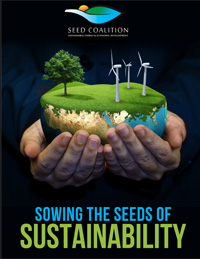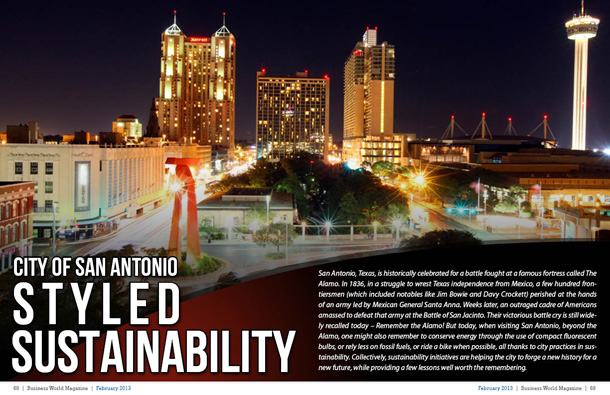

The Sustainable Energy and Economic Development Coalition (SEED) is a non-profit alliance of individuals, businesses and organizations advocating for energy efficiency, renewable solar, wind and geothermal power in Texas. They educate the public about the benefit of sustainable energy solutions which provide environmentally-desired alternatives that mitigate impacts otherwise arising in production of nuclear or coal-based generation.
Since its establishment in 1989, SEED has grown to be comprised of 2,500 members, most of whom reside in Texas. Their membership consists primarily of individuals concerned about energy efficiency and sustainability and businesses whose operations are eco-friendly.
The main service SEED offers their members is education, which has included briefing utility board candidates on what their energy options are.  “That’s something that has helped businesses embrace environmental initiatives,†says Karen Hadden, Executive Director. “We’ve seen some significant changes as people have become more educated.â€
Another way SEED educates members is by shining a spotlight on members and their practices which offer genuine examples of successful green technology applications. For example, SEED recently hosted a media day at one particular member’s property in San Antonio. This provided an opportunity for the member to garner recognition and share insight into the different techniques she employed to retrofit her home.
“A lot of times people don’t honestly know what they can do to save energy,†Hadden says. “Typically they can do things like change their lighting, their air conditioning systems – especially in Texas because it’s so hot here – and improve insulation. These kinds of things can make a huge, huge difference.â€
The association also invited the media to visit Hadden’s home, which is equipped with solar panels to run her appliances and her electric car. “If we’re running air conditioning, we would use additional electricity,†Hadden explains. “But other than that, it can power our whole house.â€
At SEED, their goal is to help members set up similarly efficient living spaces. “We help people figure out how to make changes and we help utilities go about setting up programs,†Hadden says.
Well-respected
In addition to offering education, SEED Coalition tracks relevant policy-making, legislative processes and informs the public of opportunities to voice their opinions. Their major areas of focus include the environment, health, safety and public welfare, energy efficiency and sustainable energy, transportation and telecommunication and information services.
As part of their advocacy work, SEED Coalition actively engages key policymakers –including state legislators – on various issues.
Due to their tireless efforts to promote the green industry, the SEED Coalition enjoys an “incredibly positive†relationship with all levels of government. Their input is generally well-respected by the various government bodies, Hadden says. For example, they produced a report on energy efficiency potential in San Antonio that was “incredibly solid and was well-received and respected.â€
“We did that at a time when the utility in San Antonio was looking at nuclear power, and we pointed out that energy efficiency and renewable were a much more affordable alternative that would create local jobs,†she explains.  “It was hard to argue with because it was a solid report.â€
Like all relationships, the coalition has had their share of ups and downs and has encountered some legal battles. While on occasion they don’t see eye-to-eye with the government on some issues, generally they’ve earned a lot of respect and goodwill with legislators at different levels, Hadden says. Typically, they will provide input to legislative and testimonial bodies when it comes to key issues.
The Winds of Change
Texas has been a “real hotspot†for an energy switch for quite some time, and SEED Coalition feels like they’re on the edge of a major transition. Previously, the state has been very dependent on coal, oil and gas, but now leans more towards sustainable energy, Hadden says. “Right now wind power is our huge success story.â€
Originally, the state’s goal was to see 10,000 megawatts of wind energy in place by the year 2025. Fortunately, that goal was met and exceeded well-ahead of that timeframe.  Today, as much as 25 percent of the ERCOT grid energy comes from wind, according to Hadden. “Our west Texas wind comes in at night and we also now have coastal wind that comes in during the day. This is a large part of our energy now.â€
“I think wind energy is going to continue to increase. We’ve been able to get the transmission in place, and it’s created a lot of jobs. For a rancher, for example, it’s a second income and they can still run their ranch.â€
Solar may be the next huge success story, Hadden adds, since panels are becoming much more affordable.
Those successes don’t come without challenges, however. Utility companies have been slow to catch on to the fact that they can profit from sustainable energy. “The future is in clean energy,†Hadden says, adding that the sooner they make the switch, the better off they will be economically.  “Several years ago we were actually at a point in time where there were 22 coal plants proposed in our state. It was extremely excessive and would have generated way more energy than we needed.â€
“We legally opposed many of those reactors and over time it became clear that there was a lot of public opposition, there were regulations coming down the road, and natural gas was cheaper,†she adds. “Seventeen of those plants never got built, and probably won’t. Some of our coal plants are starting to shut down and retire.â€
Looking ahead to the longer term, Hadden wants to see massive increases in energy efficiency programs that will create more jobs and produce more retrofitted-homes. Despite recent successes, the SEED Coalition still has a long ways to go to help the industry meet the state’s energy needs due to Texas’ warm and dry climate.
“The summers here are typically brutal, and we’re dealing with global warming impacts,†she says. “That’s important when it comes to energy because we need electric generation that doesn’t consume vast quantities of water.â€
“We’re hoping to see a massive transition away from coal, less use of gas and movement toward more efficiency and solar, wind and geothermal energy,†she concludes.
Â
Â
Â
Â








